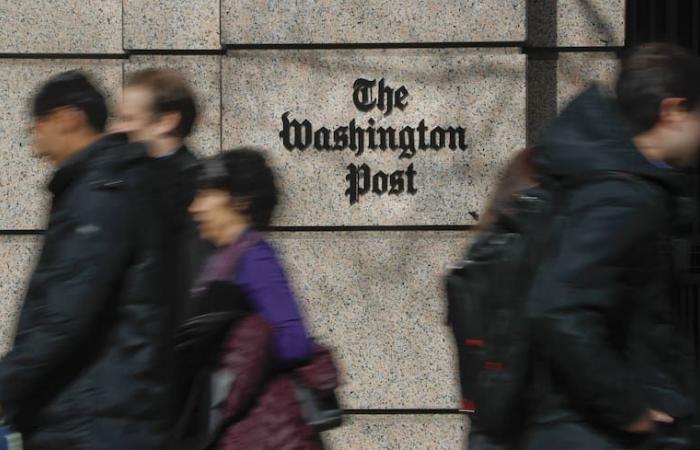Hear
WASHINGTON.- Washington Post added a new chapter to its already convulsed saga of changes and reforms that have left the newspaper locked in a strong internal crisis. The two main figures chosen by Jeff Bezosone of the richest men in the world and owner of the Post, to lead the newspaper’s future, publisher and CEO, Will Lewis, who arrived at the company at the end of the previous year, and the future editor-in-chief, Robert Winnettcame under heavy scrutiny after being accused of resorting to illegal, fraudulent and unethical methods to obtain information when working in the British media.
Lewis and Winnett worked for Sunday Timesby Rupert Murdoch, and The Daily Telegraph and both were forged in the British media ecosystem, where The press operates under other ethical standards and with different limits than those used in the majority of media in the United States. The accusations against both appeared in two investigative articles, one published by The New York Timeson Saturday, and another, very notably, published on Sunday in the same Washington Post, which also featured it on the cover of its printed edition on Monday. Post reporters tried to get a response from Lewis – who also worked at Dow Jones and the Wall Street Journalboth Murdoch publications–, but The CEO of the newspaper declined to comment for the article published in the media he directs.
“Lewis declined to comment through a Washington Post spokesperson in response to a list of detailed questions, including about the origins of the information in the 2004 stories.”
The two articles delved in depth into the past of two journalists who are now preparing to run one of the most influential newspapers in the world, and one of the most precious icons of the North American press since Bob Woodward and Carl Bernstein’s coverage of the Watergate scandal. that ended the presidency of Richard Nixon, and became a leading case of investigative journalism. Bezos’ decision – who made a strong investment after purchasing The Washington Postt in 2013 to get it out of financial ruin – to hire, first Lewis, who then brought in Winnett, has unleashed a true internal gale – reflected even in the newspaper’s own articles –, and has spread fears about the newspaper’s editorial future.
In a long article with four bylines, Washington Post revealed details of the work of a private investigator named John Ford, with an extensive career of deceptions and illegal maneuvers to obtain confidential information for the Sunday Times. There, Ford describes his collaboration with Winnett to a series of stories for which Ford provided confidential details about rich and powerful people in Great Britain. Like Lewis, Winnet, who currently works at the Daily Telegraphalso did not respond to a detailed list of questions from the journalists he must address after the November presidential elections, on November 5.
Ford’s work for Murdoch’s newspaper also appeared in the article. The New York Times. That article also indicated that Lewis assigned a journalist, Peter Koenig, a story in 2004 that used as a source telephone records that Koenig, who spoke with The New York Times, he understood that they had been obtained through hackers. A Times review of Lewis’s career also raised questions about a decision, in 2009, as editor of the Daily Telegraphof paying more than 100,000 pounds for information from a source, a practice prohibited in most North American newsrooms.
“All senior editors and most reporters at Sunday Times They knew that I obtained telephone billing data and illegal bank account transactions, almost every week, for my articles.Ford said in a 2018 interview with British news site Byline Investigates, which revealed Ford’s work for Murdoch’s newspaper.
Washington Post has traveled a certainly complicated path since the departure of Marty Baron, who led the newsroom until early 2021, when he retired. His departure coincided with the end of a fruitful era for the media, which captured a substantial increase in interest due to Donald Trump’s presidency, first – a manna for increased subscriptions – and then due to the coronavirus pandemic. But Washington Post has been fighting since then with a drop in interest, a loss of readers, a decline in subscriptions and million-dollar losses. Baron’s replacement, Sally Buzbee, the first woman to run the newspaper, left earlier this month amid a convulsive and certainly conflictive internal reorganization led by Lewis. Already earlier this month, an article by Washington Post said Lewis was “under scrutiny after media reports described him trying to dissuade journalists, including those at the newspaper, from covering his involvement in a long-running British phone-hacking lawsuit.” Now, the latest revelations about Lewis and Winnett reinforced doubts and distrust about Lewis’ integrity and ability to lead the company. Washington Post.
Margaret Sullivan, director of the Craig Newmark Center for Journalism Ethics and Safety at Columbia University’s School of Journalism, told cnn that Lewis’s position is “increasingly untenable.”
Sullivan wrote in a column in Guardian that Bezos managed to save The Washington Post by acquiring and modernizing it. “This time, he needs to save him from his own mistake.”he pointed out.






